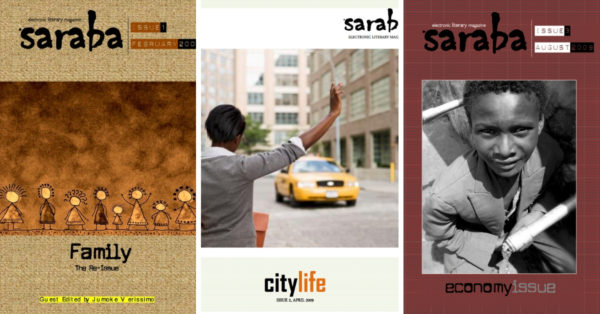
As part of its 10th anniversary celebration, Saraba Magazine recently made all of its back issues available. This comprises 30 releases: 22 main issues, five individual poetry chapbook releases, and three special supplement issues.
Here are descriptions of each release from Saraba‘s website.
Issue 1: Family
Our inaugural issue. Guest-edited by Jumoke Verissimo, the Family issue is the tissue from which our subsequent efforts were borne. What we have decided to do, here, is to set it in the template of its progenies.
Issue 2: City Life
This issue is partly a repository, partly a chance to begin a reconsideration of whether the city writes our stories or we write its.
Issue 3: Economy
In this issue, we take a humanistic approach in investigating the fraying foundations of the world‘s financial grid, insisting all the while that each economic narration, be it print, electronic or verbal, should thrive on the threshold of humanity.
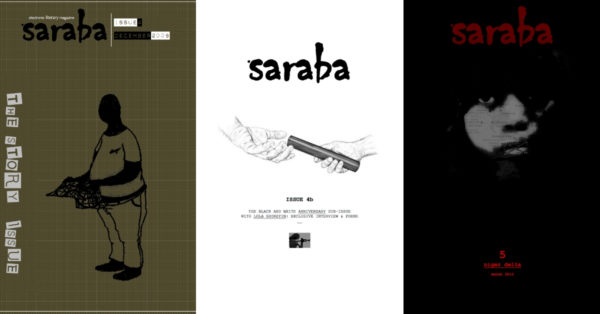
Issue 4: Story
This Issue, although it lacks a focal theme, is a collagist exhibition of ideas, impressions and expressions, quite simply an attempt to anthologize a story from every quarter, or the greater ambition to record timelessness in one single string.
Issue 5: Niger Delta
With the known caveat that any tale of the Niger Delta is tricky, after all, the details are almost always numerous, disorganised, recurring, this is an issue of questions, longing and memory. We give you an issue, may we say, of hope.

Issue 6: God
In this issue, we have compiled poetry and writings that are as ambitious as non-ambitious; for we all found that we lack the temerity to end all definitions about God.
Issue 7: Technology
With our technology issue, we find that, in writing about technology, we are writing about the world; not as it is, or as it was, but as it was, is, and would be.
Issue 8: Fashion
Issue 9: Food
Our food issue is a chart of monologues on one of the most unifying experiences.
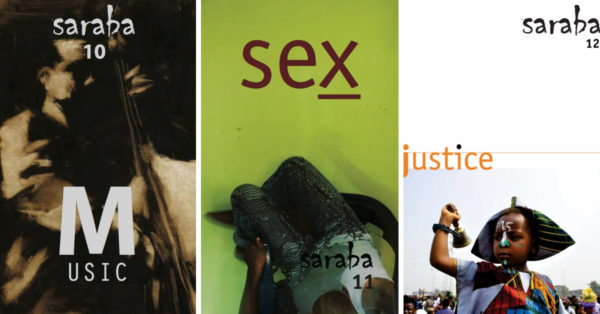
Issue 10: Music
We crafted this issue in the hope that at the end of it, readers are left with one thing: to recourse back to music, to enjoy it more intimately, to participate in the creation of its notes, to anticipate that favourite riff or thump or string, to listen for that avalanche of tune in which memory is crested, with your eyes closed.
Issue 11: Sex
In this issue, we have succeeded in collecting mostly sex-themed writings, outlooks range from the vulgar to the pious, from the introspective to the blasphemous. And that’s because our reading of sexuality must necessarily transcend boundaries, whether visible or imagined.
Issue 12: Justice
However starved for justice our world might seem, this issue teems with the belief that when there is a confluence of voices into an unshaken guttural thunder, speaking the truth to power, Justice will redound.
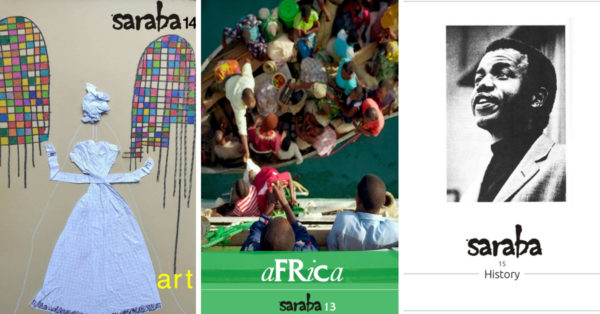
Issue 13: Africa
How can you represent what truly is Africa? For us at Saraba, we set out to have this issue explore the complex narrative that is Africa.
Issue 14: Art
We think that to deal with art we ought to present it, not talk about it. For four months we opened our window to artists producing the finest work in Nigeria, Africa and elsewhere, and the result is this issue.
Issue 15: History
In this issue, our contributors unravel the making and remaking of experiences, of History. From the personal, from the collective, there is a sense that history is not a one-off event. This issue is preceded by a prequel issue.
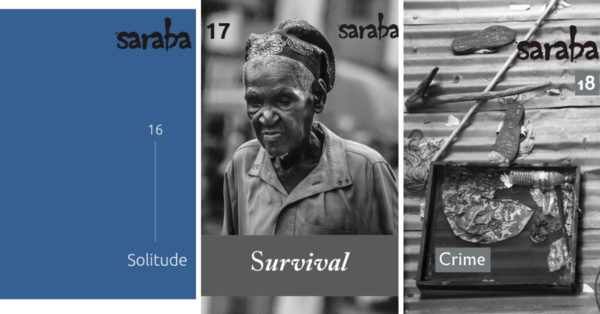
Issue 16: Solitude
Find here a cache of short poems and short stories from promising writers from Africa, writing in Africa. Follow them as they grapple with different phases of solitude: from avulsion of romantic partners to a search for solitude that leads to a brief stint in a mental institution.
Issue 17: Survival
The idea of survival is a rich place to begin any investigation about the value and mystery of human relations.
Issue 18: Crime
In this issue, we investigate seemingly unanswerable questions–questions concerning crime, punishment, but also forgiveness.
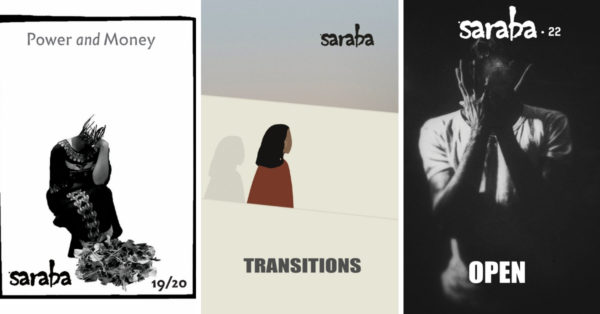
Issue 19 & 20: Power & Money
In this double-themed issue, we explore the entwined themes of power & money.
Issue 21: Transitions
In our first print issue, “Transitions,” the stories, essays, poems, and photographs consider movement, journeys, departures, and exchange.
Issue 22: Open
This issue is dedicated to the elliptical, to places liminal and in-between, to ideas explored in part.
Saraba‘s Individual Poetry Chapbook Series
Daybreak & Other Poems by Dami Ajayi (Saraba Individual Poetry Chapbook Series No. 1)
Dami Ajayi is reaching for the familiar and is slowly getting to it. His poems are delivering everything at once; romance, satire, humour, grief, uncertainty; it is delivering the image of what it means – no, what it has always meant – to be Nigerian.
The Poet of Sand by Umar Sidi (Saraba Individual Poetry Chapbook Series No. 2)
Epical in scope, Umar Abubakar Sidi’s poems draw in a cast ranging from a 13th century Persian poet to contemporary American ones, borrowing a wealth of allusions liberally from Judeo-Christian-Islamic religion and from the street just around the corner, all made elegant in a template decidedly inspired by Sufi thought.
Epiphanies: New Poems by Jumoke Verissimo (Saraba Individual Poetry Chapbook Series No. 3)
The nine poems serialized as “Epiphanies” address the curious and conflicted relationship we have, today, with seeing, the eyes, and the sense of sight.
Attempted Speech & Other Fatherhood Poems by Kola Tubosun (Saraba Individual Poetry Chapbook Series No. 4)
The poems here reflect a certain preoccupation: fatherhood. They are personal reflections on that and other related histories, apprehensions, tangents, private moments, and expectations of yet unfolding futures.
Velvet-Blue & Other Uncertainties by Tunji Olalere (Saraba Individual Poetry Chapbook Series No. 5)
With poetics that embraces scientific registers and a rhetorical turn of phrase, Olalere’s poetry is at once playful and exciting. There are echoes of layered influences tempered by an uncanny ear for prosody. That Soyinkaesque interrogatory verve and Heaneyesque subtlety, that Nerudaesque clarity of vision, which fuses readily with a modernist tendency to borrow lyrics, verbatim, from contemporary highlife music.
Saraba‘s Special Issues & Supplements
Saraba Storymoja Issue
This is a special issue on literary festivals in Africa, produced in collaboration with Storymoja Africa for the Storymoja Festival 2015.
Saraba Displacement Issue
This is a special issue on global migration and refugees featuring the work of Tobias Zielony & Victor Ehikhamenor, as part of the German Pavilion, 56th Venice Biennale, 2015.
Saraba Etisalat Prize for Literature 2015 Issue
This is a special issue of Saraba Magazine on the Etisalat Prize for Literature 2015, with interviews with the longlisted writers, review essays, and commentary by judges and publishers.





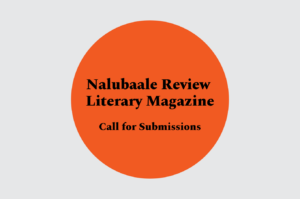



slot mobile nigeria website March 23, 2019 22:37
Jane had been out of the globe for over each and every year and returned where you will find start a new position as a physiotherapist in a family run business. She was excited about the new role like husband and wife team who ran the practice ended up being asking her whilst to join them as a you are employee. In greatest idea . of small towns and mom & pop stores, a business was vibrant or destitute based upon the value the owner provided consumers. Customers enjoyed walking in a business where the cashier would greet them by more or less name by using a good morning or good afternoon. It made customer feel warm, welcomed and appreciated. When big, box stores started popping up, the value of being addressed with individual attention wasn't regarded as much being a lower priced item. Family owned businesses start to wane and drop amazing local town map. It is important to get to know the ace333 fast download at various wedding reception halls. What is the wedding planner on staff who through doing work in? Perhaps you want a person that you can sit down with to debate your ways. Are there servers on office managers? You may want these professionals to assist planning every facet of this specific big times. When interviews gets into the "Do you could have any things?" stage, here are some questions you might like must. The aim here would be to him/her to describe their ideal employee. Other machines are sold in these large quantities that may be go to waste. Do you remember the Seinfeld episode where Kramer obtained case of canned beef stew, at the warehouse club, that he ended up feeding in order to some flatulent form of transport? See my article on bargain cleaning utility caddy to take a some actual Sam's Club, cleaning products I assign. There's no easy job you could have just started one. Entering the regarding call centers is the same as going in your globe. A person gets to approach different people, with different cultures, languages, personalities, attitudes and such like. Those who have tried may have two reactions with respect to the job - it's hard and it's challenging. The Security cameras Systems are necessary factors in life other than food and clothing. It was necessary to secure our time and belongs from the hands of this criminals. Though they do not stop any crime whether or not it's happening it can be definitely assists you to prevent somewhat or helps in the identification of the criminals which in effective investigation. The cameras are not luxury anymore, they are among must haves in people's list, whether he's a big shot also known as commoner. So without thinking much just get one for work! http://blog.fileserver.ksac.co.kr/php_test.php?a%5B%5D=%3Ca+href%3Dhttp%3A%2F%2FWww.0912666.com%2Fdiscuz%2Fhome.php%3Fmod%3Dspace%26uid%3D858440%26do%3Dprofile%26from%3Dspace%3Elive+casino88%3C%2Fa%3E